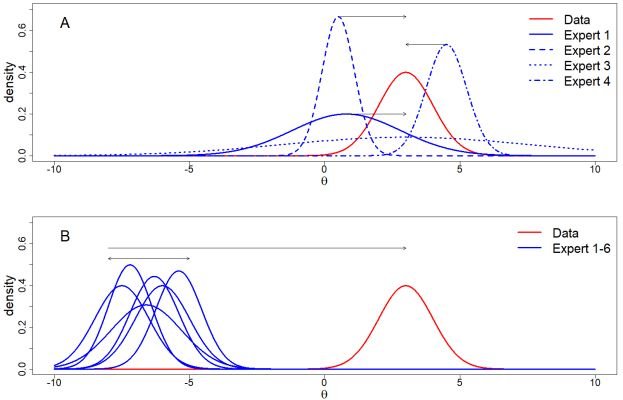Using the Data Agreement Criterion to Rank Experts’ Beliefs
Experts’ beliefs embody a present state of knowledge. It is desirable to take this knowledge into account when making decisions. However, ranking experts based on the merit of their beliefs is a difficult task. In this paper, we show how experts can be ranked based on their knowledge and their level of (un)certainty. By letting experts specify their knowledge in the form of a probability distribution, we can assess how accurately they can predict new data, and how appropriate their level of (un)certainty is. The expert’s specified probability distribution can be seen as a prior in a Bayesian statistical setting. We evaluate these priors by extending an existing prior-data (dis)agreement measure, the Data Agreement Criterion, and compare this approach to using Bayes factors to assess prior specification. We compare experts with each other and the data to evaluate their appropriateness. Using this method, new research questions can be asked and answered, for instance: Which expert predicts the new data best? Is there agreement between my experts and the data? Which experts’ representation is more valid or useful? Can we reach convergence between expert judgement and data? We provided an empirical example ranking (regional) directors of a large financial institution based on their predictions of turnover.
Veen, D., Stoel, D., Schalken, N., & van de Schoot, R. (2018). Using the Data Agreement Criterion to Rank Experts' Beliefs. Entropy, 20(8), 592; doi: 10.3390/e20080592
Due to a coding error the marginal likelihoods have not been correctly calculated for the empirical example and thus the Bayes Factors following from these marginal likelihoods are incorrect. The corrections required occur in Section 3.2 and in two paragraphs of the discussion in which the results are referred to. The corrections have limited consequences for the paper and the main conclusions hold. Additionally typos in Equations, and, an error in the numbering of the Equations are remedied. View Full-Text
The data archive can be found on the Open Science Framework (OSF) webpage for this project at https://osf.io/u57qs.
Ducos PhD project with Rens focusses on providing a solution to small data problems in latent growth curve models. With few data points, it can be impossible to estimate the model of interest. Yet asking a different (simplified) question the data can answer may not be desirable.
Naomi is working on her research master thesis focusing on using expert knowledge in Bayesian analyses, by letting experts make predictions in a probabilistic form of a prior distribution. With the Data Agreement Criterion (DAC)...




